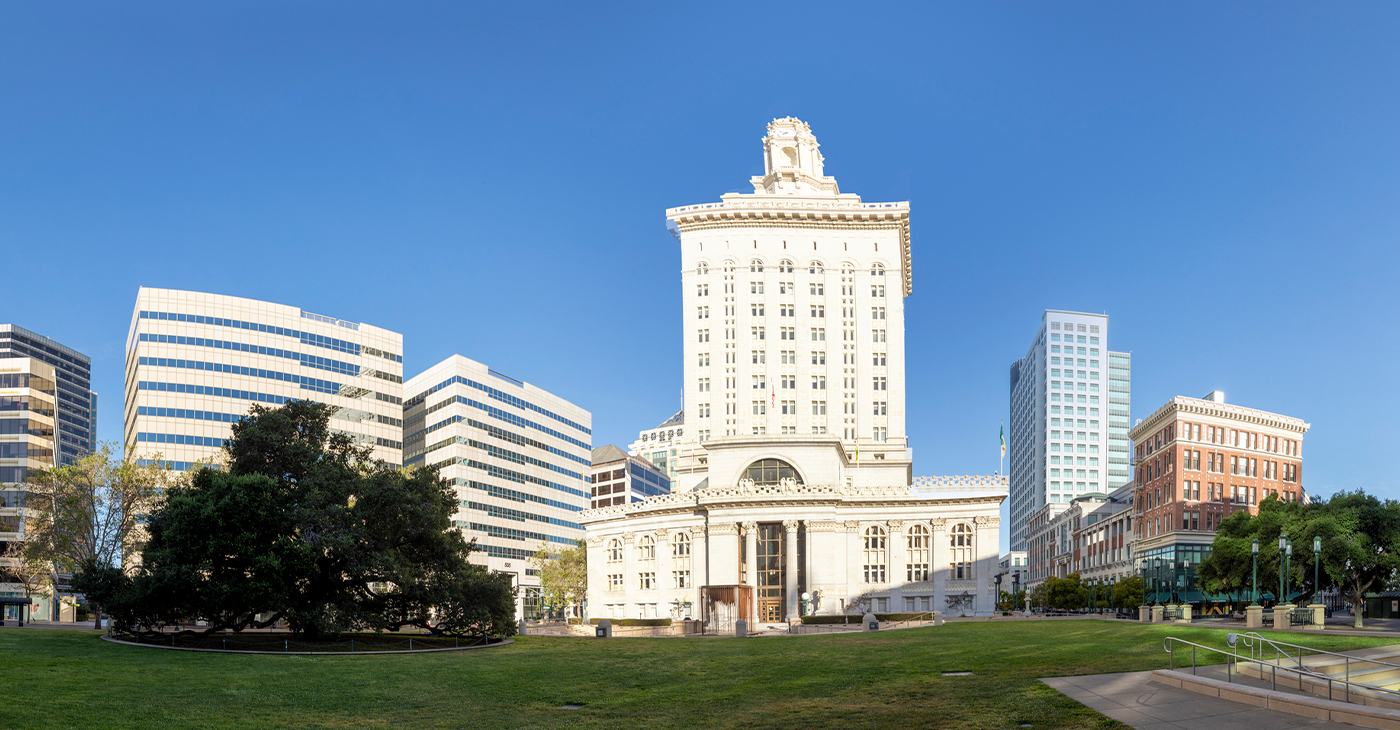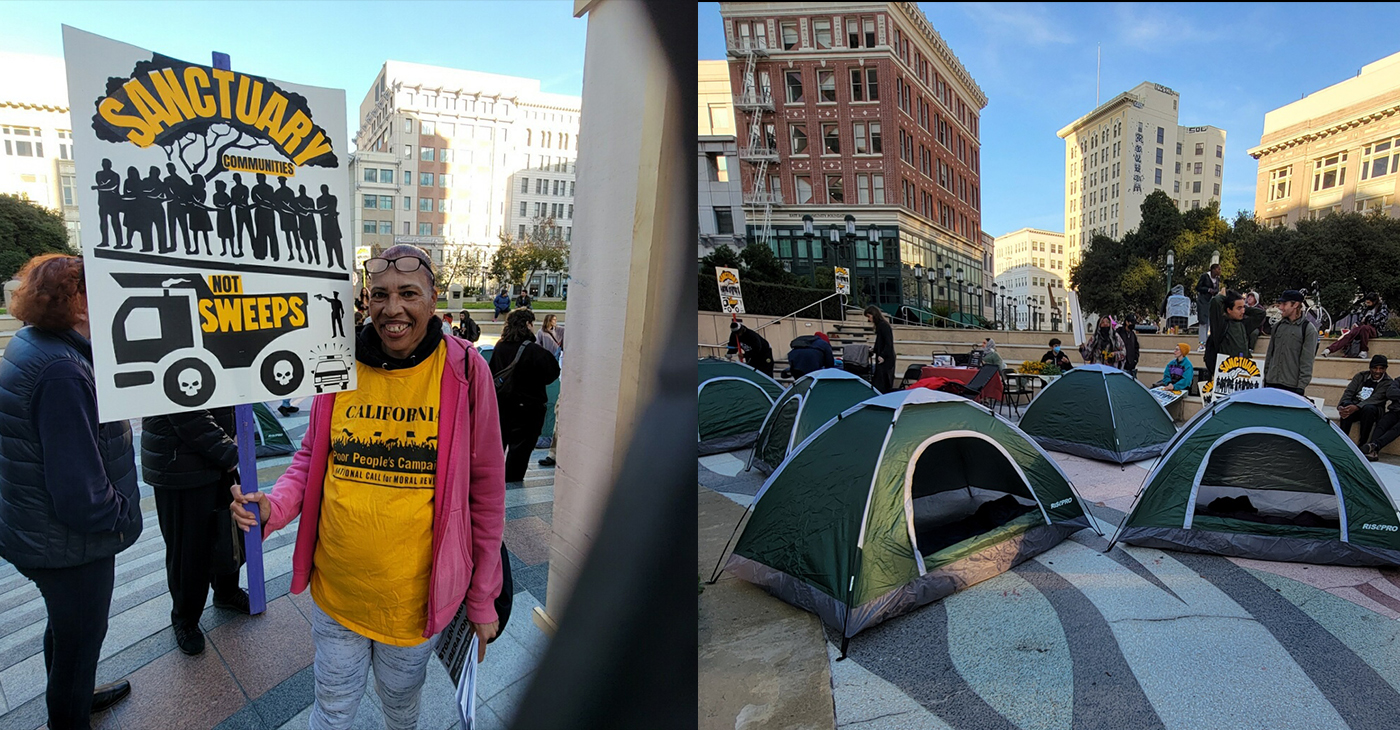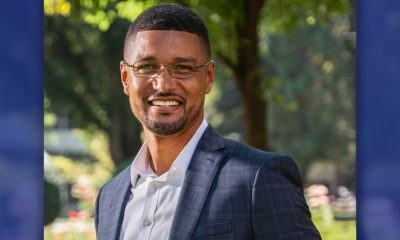City Government
Sen. Padilla, Rep. Ruiz Push for National Park Named for César E. Chávez
U.S. Sen. Alex Padilla (D-CA) and Congressman Raul Ruiz (D-CA-25) last week introduced bicameral legislation to create the “César E. Chávez and the Farmworker Movement National Historical Park.” The bill establishes the César E. Chávez and the Farmworker Movement National Historical Park, which incorporates the headquarters of the United Farm Workers (UFW) at La Nuestra Señora Reina de la Paz in Keene, California, and expands upon the existing César E. Chávez National Monument.

By Antonio Ray Harvey
California Black Media
U.S. Sen. Alex Padilla (D-CA) and Congressman Raul Ruiz (D-CA-25) last week introduced bicameral legislation to create the “César E. Chávez and the Farmworker Movement National Historical Park.”
The bill establishes the César E. Chávez and the Farmworker Movement National Historical Park, which incorporates the headquarters of the United Farm Workers (UFW) at La Nuestra Señora Reina de la Paz in Keene, California, and expands upon the existing César E. Chávez National Monument.
Co-sponsored by Sen. Dianne Feinstein (D-CA) and U.S. Congressmembers Raul Grijalva (D-AZ-7) and Rueben Gallego (D-AZ-3), the bill calls for preserving nationally significant sites associated with labor and civil rights leader César E. Chávez and the farmworker movement in California and Arizona.
Further, the bill includes a provision to “Conduct a National Historic Trail Study” for the “Farmworker Peregrinación National Historic Trail,” the 300-mile march route taken by farmworkers between Delano and Sacramento in 1966.
“On César Chávez Day we commemorate the work and legacy of an iconic Latino civil rights leader,” Sen. Alex Padilla said in a statement. “Establishing the César E. Chávez and the Farmworker Movement National Historical Park will pay proper homage to Chávez’s tireless work for the dignity, respect and equal treatment of farmworkers.
Last week, Gov. Gavin Newsom declared March 31, 2023, Cesar Chavez Day in California.
Padilla continued, “Our national park system tells the story of our nation and preserves the people and movements that we value as Americans. Yet our park system does not yet adequately preserve the full culture and diverse legacy of all Americans. This legislation would bring us closer to the recognition farmworkers have earned and deserve.”
Chávez, who died in 1993, was a Latino icon and civil rights leader, labor leader and community organizer whose legacy is intricately connected to the story of California, the farmworker labor movement and the push for worker and civil rights.
Chávez empowered Latinos and farmworkers to fight for fair wages, health care coverage, pension benefits, housing improvements, and countless other protections for their well-being.
His commitment to social justice has inspired many, and advocates and activists point to him as a role model for their ongoing efforts to improve the lives of all people, regardless of their ethnicity or the color of their skin.
As a farmworker, César Chávez maintained a strong connection to the environment; and the bill by the lawmakers intends to uplift Chavez’s story, and those of others whose contributions helped build the farmworker and civil rights movements that are pillars of American history.
“Growing up the son of farmworkers in the Coachella Valley, I remember seeing César Chávez and the sense of hope he gave to our communities and farmworkers across the United States. His story still inspires and motivates me even today,” said Ruiz.
“My legislation with Sen. Padilla, the César E. Chávez and the Farmworker Movement National Historical Park Act, will help the National Park Service (NPS) embrace their role as storytellers of our nation and reflect the diversity and richness of our people.”
There are hundreds of sites that are part of the national park system that preserve natural, historical, and cultural heritage while offering vital spaces for teaching, learning, and outdoor recreation.
If the legislation passes, the Department of Interior will be required to complete a general management plan for the historical park within three years.
In 2012, President Barack Obama’s established the César E. Chávez National Monument in Keene, which recognizes the achievements and contributions to the history of our nation by Chávez and the farmworker movement.
Obama traveled to Keene to announce the establishment of the monument. From the early 1970s until his death, the site functioned as the residence and workplace of Chávez and his family, and now is home to Chávez’s grave.
“César Chávez gave a voice to poor and disenfranchised workers everywhere,” Obama stated in October 2012. “La Paz was at the center of some of the most significant civil rights moments in our nation’s history, and by designating it a national monument, Chávez’ legacy will be preserved and shared to inspire generations to come.”
This California Black Media report was supported in whole or in part by funding provided by the State of California, administered by the California State Library.
Bay Area
Glydways Breaking Ground on 14-Acre Demonstration Facility at Hilltop Mall
Glydways has been testing its technology at CCTA’s GoMentum Station in Concord for several years. The company plans to install an ambitious 28-mile Autonomous Transit Network in East Contra Costa County. The new Richmond facility will be strategically positioned near that project, according to Glydways.

The Richmond Standard
Glydways, developer of microtransit systems using autonomous, small-scale vehicles, is breaking ground on a 14-acre Development and Demonstration Facility at the former Hilltop Mall property in Richmond, the Contra Costa Transportation Authority (CCTA) reported on social media.
Glydways, which released a statement announcing the project Monday, is using the site while the mall property undergoes a larger redevelopment.
“In the interim, Glydways will use a portion of the property to showcase its technology and conduct safety and reliability testing,” the company said.
Glydways has been testing its technology at CCTA’s GoMentum Station in Concord for several years. The company plans to install an ambitious 28-mile Autonomous Transit Network in East Contra Costa County. The new Richmond facility will be strategically positioned near that project, according to Glydways.
The new Richmond development hub will include “over a mile of dedicated test track, enabling Glydways to refine its solutions in a controlled environment while simulating real-world conditions,” the company said.
Visitors to the facility will be able to experience on-demand travel, explore the control center and visit a showroom featuring virtual reality demonstrations of Glydways projects worldwide.
The hub will also house a 13,000-square-foot maintenance and storage facility to service the growing fleet of Glydcars.
“With this new facility [at the former Hilltop Mall property], we’re giving the public a glimpse of the future, where people can experience ultra-quiet, on-demand transit—just like hailing a rideshare, but with the reliability and affordability of public transit,” said Tim Haile, executive director of CCTA.
Janet Galvez, vice president and investment officer at Prologis, owner of the Hilltop Mall property, said her company is “thrilled” to provide space for Glydways and is continuing to work with the city on future redevelopment plans for the broader mall property.
Richmond City Manager Shasa Curl added that Glydways’ presence “will not only help test new transit solutions but also activate the former Mall site while preparation and finalization of the Hilltop Horizon Specific Plan is underway.
Alameda County
Last City Council Meeting of the Year Ends on Sour Note with Big Budget Cuts
In a five to one vote, with Councilmembers Carroll Fife and Janani Ramachandran excused, the council passed a plan aimed at balancing the $130 million deficit the city is facing. Noel Gallo voted against the plan, previously citing concerns over public safety cuts, while Nikki Fortunato-Bas, Treva Reid, Rebecca Kaplan, Kevin Jenkins, and Dan Kalb voted in agreement with the plan.

By Magaly Muñoz
In the last lengthy Tuesday meeting of the Oakland City Council for 2024, residents expressed strong opposition to the much needed budget cuts before a change in leadership was finalized with the certification of election results.
In a five to one vote, with Councilmembers Carroll Fife and Janani Ramachandran excused, the council passed a plan aimed at balancing the $130 million deficit the city is facing. Noel Gallo voted against the plan, previously citing concerns over public safety cuts, while Nikki Fortunato-Bas, Treva Reid, Rebecca Kaplan, Kevin Jenkins, and Dan Kalb voted in agreement with the plan.
Oakland police and fire departments, the ambassador program, and city arts and culture will all see significant cuts over the course of two phases.
Phase 1 will eliminate two police academies, brown out two fire stations, eliminate the ambassador program, and reduce police overtime by nearly $25 million. These, with several other cuts across departments, aim to save the city $60 million. In addition, the council simultaneously approved to transfer restricted funds into its general purpose fund, amounting to over $40 million.
Phase 2 includes additional fire station brownouts and the elimination of 91 jobs, aiming to recover almost $16 million in order to balance the rest of the budget.
Several organizations and residents spoke out at the meeting in hopes of swaying the council to not make cuts to their programs.
East Oakland Senior Center volunteers and members, and homeless advocates, filled the plaza just outside of City Hall with rallies to show their disapproval of the new budget plan. Senior residents told the council to “remember that you’ll get old too” and that disturbing their resources will only bring problems for an already struggling community.
While city staff announced that there would not be complete cuts to senior center facilities, there would be significant reductions to staff and possibly inter-program services down the line.
Exiting council member and interim mayor Bas told the public that she is still hopeful that the one-time $125 million Coliseum sale deal will proceed in the near future so that the city would not have to continue with drastic cuts. The deal was intended to save the city for fiscal year 2024-25, but a hold up at the county level has paused any progress and therefore millions of dollars in funds Oakland desperately needs.
The Coliseum sale has been a contentious one. Residents and city leaders were originally against using the deal as a way to balance the budget, citing doubts about the sellers, the African American Sports and Entertainment Group’s (AASEG), ability to complete the deal. Council members Reid, Ramachandran, and Gallo have called several emergency meetings to understand where the first installments of the sale are, with little to no answers.
Bas added that as the new Alameda County Supervisor for D5, a position she starts in a few weeks, she will do everything in her power to push the Coliseum sale along.
The city is also considering a sales tax measure to put on the special election ballot on April 15, 2025, which will also serve as an election to fill the now vacant D2 and mayor positions. The tax increase would raise approximately $29 million annually for Oakland, allowing the city to gain much-needed revenue for the next two-year budget.
The council will discuss the possible sales tax measure on January 9.
Activism
Protesters Gather in Oakland, Other City Halls, to Halt Encampment Sweeps
The coordinated protests on Tuesday in San Francisco, Oakland, Vallejo, Fresno, Los Angeles and Seattle, were hosted by Poor Magazine and Wood Street Commons, calling on cities to halt the sweeps and focus instead on building more housing.

By Post Staff
Houseless rights advocates gathered in Oakland, San Francisco, Los Angeles, and other city halls across California and Washington state this week protesting increased sweeps that followed a U.S. Supreme Court decision over the summer.
The coordinated protests on Tuesday in San Francisco, Oakland, Vallejo, Fresno, Los Angeles and Seattle, were hosted by Poor Magazine and Wood Street Commons, calling on cities to halt the sweeps and focus instead on building more housing.
“What we’re dealing with right now is a way to criminalize people who are dealing with poverty, who are not able to afford rent,” said rights advocate Junebug Kealoh, outside San Francisco City Hall.
“When someone is constantly swept, they are just shuffled and things get taken — it’s hard to stay on top of anything,” said Kealoh.
Local houseless advocates include Victoria King, who is a member of the coordinating committee of the California Poor People’s Campaign. She and Dr. Monica Cross co-chair the Laney Poor People’s Campaign.
The demonstrations came after a June Supreme Court ruling expanded local governments’ authority to fine and jail people for sleeping outside, even if no shelter is available. Gov. Gavin Newsom in California followed up with an order directing state agencies to crack down on encampments and urging local governments to do the same.
Fresno, Berkeley and a host of other cities implemented new rules, making it easier for local governments to clear sidewalk camps. In other cities, such as San Francisco, officials more aggressively enforced anti-camping laws already on the books.
-

 California Black Media4 weeks ago
California Black Media4 weeks agoCalifornia to Offer $43.7 Million in Federal Grants to Combat Hate Crimes
-

 Black History4 weeks ago
Black History4 weeks agoEmeline King: A Trailblazer in the Automotive Industry
-

 California Black Media4 weeks ago
California Black Media4 weeks agoGov. Newsom Goes to Washington to Advocate for California Priorities
-

 Activism4 weeks ago
Activism4 weeks agoOakland Post: Week of November 27 – December 3, 2024
-

 California Black Media4 weeks ago
California Black Media4 weeks agoCalifornia Department of Aging Offers Free Resources for Family Caregivers in November
-

 Activism2 weeks ago
Activism2 weeks agoButler, Lee Celebrate Passage of Bill to Honor Congresswoman Shirley Chisholm with Congressional Gold Medal
-

 Activism2 weeks ago
Activism2 weeks agoPost News Group to Host Second Town Hall on Racism, Hate Crimes
-

 Activism2 weeks ago
Activism2 weeks agoDelta Sigma Theta Alumnae Chapters Host World AIDS Day Event






















































